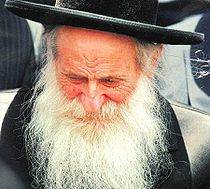- Moshe Teitelbaum (Satmar)
-
This article is about the previous Satmar Rebbe. For the 18th Century rabbi from Sátoraljaújhely, see Moshe Teitelbaum (Ujhel)
Moshe Teitelbaum 
Born November 1, 1914
Sighet, Hungary (now Romania)Died April 24, 2006 (aged 91)
Williamsburg, Brooklyn, USAResting place Kiryas Joel Nationality American Occupation Rabbi Religion Haredi - Hasidic Orthodox Judaism Moshe (Moses) Teitelbaum (November 1, 1914 – April 24, 2006) was a Hasidic rebbe and the world leader of the Satmar Hasidim, which is believed to be one of the largest Hasidic communities in the world, with some 120,000 followers.
Contents
Early life
Teitelbaum was the second son of Rabbi Chaim Tzvi Teitelbaum, author of Atzei Chaim, the previous Sigheter Rebbe and the nephew of Rabbi Joel Teitelbaum. His mother was Bracha Sima Halberstam. Moshe was born in Ratzfert, Hungary. He and his older brother, Yekusiel Yehuda Teitelbaum, were orphaned in 1926, when they were eleven and fourteen, respectively. Moshe was raised by family friends and relatives, including his uncle, Joel, and his grandfather, Rabbi Shulem Eliezer Halberstam of Ratzfert.[1]
In 1936, he married his cousin Leah Meir, daughter of Rabbi Hanoch Heinoch Meir of Karecska, where Teitelbaum held the position of rosh yeshiva (dean). In 1939, he became the rabbi of Zenta, Yugoslavia (now Serbia).
In late spring 1944, the Hungarian government, assisted by Nazi forces led by Adolf Eichmann, began deporting Jews en-masse. Teitelbaum and his wife were sent to Auschwitz, where Leah and their three children died. Teitelbaum was then transferred to Traglitz and after that to Theresienstadt, where he was liberated in 1945.
Post-war
In 1946[2] Teitelbaum married Pessel Leah, the daughter of Rabbi Aaron Teitelbaum of Volovo.[3] It was his second marriage and her first.[4] The couple moved back to Sighet, briefly reviving Jewish life in Teitelbaum's father's hometown. But they were soon forced to flee Communist persecution, leaving for Prague and then setting sail for New York, where they arrived in fall 1947.[2] There Teitelbaum became known as the Sigheter Rebbe. Moshe initially established a beth midrash, Atzei Chaim Siget in his uncle Joel's Satmar enclave in Williamsburg, Brooklyn, and later moved to Boro Park in 1966. He succeeded his uncle as Satmar rebbe, following his death in 1979, though some dissidents in Satmar opposed him, including the Bnei Yoel (or Kagners, opponents), a group of Satmar Hasidim that did not accept Teitelbaum as rebbe and remained loyal to Joel's wife Alta Fayga Teitelbaum, and her candidate for rebbe, Nachman Brach. [5] [6] [7]
Teitelbaum was the author of a five-volume Hasidic commentary on the Bible entitled Berach Moshe. He was survived by his wife, four sons, two daughters (his eldest daughter from his second marriage died in his lifetime), over eighty-six grandchildren, many great grandchildren, and one great-great granddaughter, born earlier on the day that he died.[8][9]
Ideology
Teitelbaum continued to oppose modern Zionism as developed by his predecessor, Joel Teitelbaum.
Death and succession
On April 24, 2006, at the age of 91, Teitelbaum died of cancer.[10] Tens of thousands of members of the Jewish community attended his funeral and burial procession in Williamsburg, Brooklyn and later in Kiryas Joel, New York. Eulogies in the main Satmar synagogue in Williamsburg were said by all the rebbe's children or their husbands in order of their respective ages. Teitelbaum was buried near his uncle Joel in the sect's cemetery in Kiryas Joel.
Following Teitelbaum's death, a major split developed among the Satmar Hasidim as to who should become their leader.
Two of Teitelbaum's sons, Rabbi Aaron and Rabbi Zalman were crowned by their fellow supporters to succeed their father. Rabbi Aaron's main residence is in Kiryas Joel, New York and Rabbi Zalman's main residence is in Williamsburg, Brooklyn, though each has supporters and institutions in both locations.
Reactions
- George Pataki, Governor of New York State: "The Rebbe touched and inspired the countless people who came into contact with him while shepherding his congregation to enormous growth over the past decades of his leadership. May his memory be a blessing for all of us."
- Michael Bloomberg, Mayor of New York City: "[The] Rebbe was a gentle soul who carried himself with poise and distinction. From the fires of the Holocaust, the grand rebbe and his uncle [Joel Teitelbaum] performed a miracle here in New York by rebuilding their community to match its glory days in Europe. Our hearts and prayers are with the Satmar community in this city and worldwide as they mourn the passing of their beloved spiritual leader." See also, Mayor Bloomberg attending the funeral procession.

Sources
- Rabinowicz, Tzvi M. The Encyclopedia of Hasidism. New York: Jason Aronson, 1996. ISBN 1-56821-123-6
- ^ פתגמין קדישין תכ"ג
- ^ a b Cohen, A. (8 July 2010). "Rebbitzen Pesil Layah Teitelbaum o"h". Dei'ah VeDibur. http://chareidi.shemayisrael.com/archives5770/MTS70arebteitlbm.htm. Retrieved 9 January 2011.
- ^ Tannenbaum, Rabbi Gershon (15 July 2010). "Rebbetzin Pessel Leah Teitelbaum, a"h (1922-2010), Satmar Rebbetzin". The Jewish Press. http://www.thejewishpress.com/pageroute.do/44518/. Retrieved 9 January 2011.
- ^ Hoffman, Rabbi Yair (6 July 2010). "Satmar Rebbetzin Passes Away". Five Towns Jewish News. http://www.5tjt.com/international-news/7627-satmar-rebbitzen-passes-away. Retrieved 9 January 2011.
- ^ http://hasidicnews.com/news19.shtml
- ^ http://www.rickross.com/reference/ultra-orthodox/ultra11.html
- ^ Barron, James (3 July 1996). "Sale of a Grand Rabbi's Home Is Upheld". The New York Times. http://query.nytimes.com/gst/fullpage.html?res=9B02E2DF1039F930A35754C0A960958260.
- ^ . http://www.nypost.com/news/regionalnews/67532.htm.[dead link]
- ^ http://www.courts.state.ny.us/reporter/3dseries/2005/2005_25482.htm#1FN
- ^ Joffe, Lawrence (14 July 2006). "Rabbi Moshe Teitelbaum". The Guardian (London). http://www.guardian.co.uk/news/2006/jul/14/guardianobituaries.religion.
External links
Categories:- 1914 births
- 2006 deaths
- People from Sighetu Marmaţiei
- Rebbes of Satmar
- American Hasidic rabbis
- Rabbis of the Edah HaChareidis
- Hungarian Orthodox rabbis
- Hasidic rabbis in Europe
Wikimedia Foundation. 2010.
